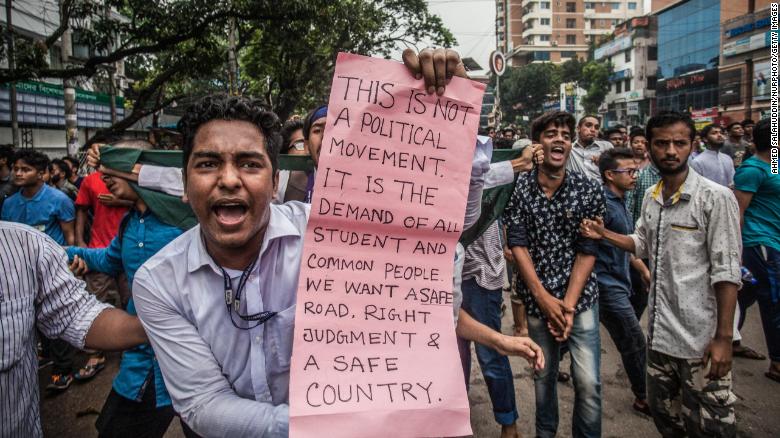News Analysis |
The United Nations has expressed concern for the safety of children and young people in the ongoing protests for safe roads in Dhaka and other parts of Bangladesh. It has “urgently” called upon all parties to keep everyone – including children and young people – safe on the roads and safe from any kind of violence.
“Students and young people have a legitimate right to speak out on issues of concern to them including road safety issues and to have their opinion heard without the threat of violence,” it said in a statement on Sunday. “It is a matter of deep concern that a number of young people taking part in demonstrations in the capital have been injured over the last few days. Many schools have been closed as a result of the protests, depriving children of learning opportunities,” it added.
Many analysts have expressed concern over what is seen as a march towards authoritarianism under the government of Sheikh Hasina Wajid. The situation in Bangladesh has aroused sharp concerns the world over.
The statement quoted UN Resident Coordinator Mia Seppo as saying, “We are deeply concerned about the reports of violence and call on all for calm. The concerns expressed by youth about road safety are legitimate and a solution is needed for a mega city like Dhaka. A functioning public transport system should ensure the safety of all, including children, young girls and women.” The UN has long campaigned for better road safety across the world and traffic accidents in Bangladesh are one of the major killers of young people, the world body said.
Read more: India deports legal advisor of imprisoned Bangladeshi Opposition leader
There are more than 20,000 road fatalities every year in Bangladesh, it added, citing a World Health Organization report. Thousands of Bangladeshi students have vowed to stay on the streets protesting until their government agrees to demands for improved road safety and justice for those who died in traffic and during violent clashes over the weekend.
Throngs of students paralyzed parts of Bangladesh’s capital on Sunday to protest the country’s abysmal road safety conditions. Teenagers dressed in school uniforms erected checkpoints across the city, forcing the police and government ministers to observe traffic laws that are otherwise poorly enforced. The students in Bangladesh are protesting for justice and road safety measures after a bus crushed two of their peers to death and injured several others in Dhaka last Sunday.
“Students and young people have a legitimate right to speak out on issues of concern to them including road safety issues and to have their opinion heard without the threat of violence,” it said in a statement on Sunday.
The protesters clashed with the police, pro-government youths and transporters at different parts of the capital during the weeklong demonstrations. Journalists covering the demonstrations have also been attacked and injured. The protests intensified on Sunday when university students joined the middle and high school students who have led the movement so far.
Read more: Bangladesh’s democratic erosion: how democracy assistance can help
The newcomers joined in solidarity after a pro-government student union joined the police’s ranks and clashed with protesters on Saturday and Sunday. Armed with scraps of metal and thick, gnarled tree branches, pro-government student protesters attacked and wounded five photojournalists, including a photographer from The Associated Press. At least 200 people have been wounded in the protests.
Police used tear gas and batons to subdue demonstrators and shut, or slowed down, access to the internet in several areas to curb protest participation and information flow. The move prevented protesters from uploading pictures and video of their demonstrations to social media or the messaging service WhatsApp, prompting protesters to accuse the government of blocking free speech. But Telecommunication Minister Mustafa Jabbar said in an interview that a technical issue had prevented mobile providers from offering faster connections.
Thousands of Bangladeshi students have vowed to stay on the streets protesting until their government agrees to demands for improved road safety and justice for those who died in traffic and during violent clashes over the weekend.
Other officials said the mobile internet speeds had been purposefully slowed after rumours that the Awami League party detained, killed and raped several demonstrators at one of their offices in Dhaka. Meanwhile, Shipping Minister Shajahan Khan mocked the protesters during a news conference last week. Pointing out that a recent bus crash in neighboring India had killed 30 passengers, he said that “they don’t complain about it as we do.” Khan is also the head of Bangladesh’s powerful transportation lobby, which activists say is a conflict of interest.
Read more: Fashion giants in rights drive after Bangladesh factory tragedy
Many analysts have expressed concern over what is seen as a march towards authoritarianism under the government of Sheikh Hasina Wajid. The situation in Bangladesh has aroused sharp concerns the world over. The situation worsened after the controversial 2014 elections that saw the consolidation of Sheikh Hasina’s government. Analysts assert that India has played a crucial role in establishing Sheikh Hasina’s stranglehold over the nation and in return has reaped many concessions from Dhaka.













